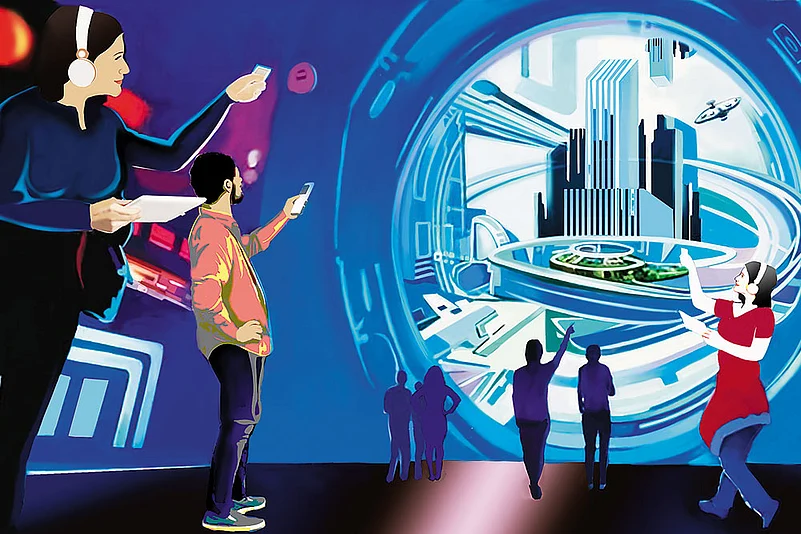“But what is reality?” asked the gnome-like man. “All is dream, all is illusion; I am your vision as you are mine.”
When American author Stanley Weinbaum penned Pygmalion’s Spectacles in 1935, he introduced his protagonist Dan Berk to an Elfin professor who had invented a pair of goggles that allowed the wearer to sensorily immerse themselves into the story with sight, sound, taste, smell and touch. While many dismissed the book as new-fangled science fiction back then, Weinbaum might well have given the world its first glimpse of metaverse, albeit unwittingly Of course, Neal Stephenson officially came up with this term in his 1992 novel Snow Crash, when he presented a virtual space where characters could escape their dreary totalitarian reality. Today, metaverse has become the social currency everyone wants to cash in on.

This interest was not a sudden one. As per Citi’s Metaverse and Money: Decrypting the Future report, a large part of this interest was sparked by the boom in cryptocurrency and rising sales of non-fungible tokens (NFTs) towards the end of 2021.
Soon, Big Tech players started indicating their interest in this cyber landscape with a flurry of investment announcements. The report also estimated that the total addressable market for metaverse could be between $8 trillion and $13 trillion by 2030, with total metaverse users numbering around five billion.

NextMeet virtually connects events, seminars and group meetings to any social gathering
Cornering the Market
While major tech companies, independent creators and leading brands navigate the alleys of metaverse, what kind of role can start-ups play in the emerging ecosystem? Quite a pertinent part, it would appear, if one sees the numbers stacking up.
According to Crunchbase, metaverse-focused companies raised $10.4 billion across more than 600 venture capital deals in 2021, nearly double the amount raised in 2020. A recent Bloomberg analysis estimated that global metaverse revenue opportunities could approach $800 billion in 2024.
Closer home, start-ups are increasingly staking their claim in the metaverse universe. While the maximum activity is evident in the gaming space, they are exploring other areas, including fitness, food and meetings.
One start-up player that has taken a step into this virtual realm is NextMeet. It is a collaboration platform that connects events, conferences, seminars and group meetings to any social gathering. Launched in October 2020, it showcases different environments from expo halls to theatres, concert halls, meeting rooms and breakout offices, where, typically, groups of over 20 people can gather.
“We have started generating early revenues and have subscriptions from thousands of people across the globe. But we will eventually go for the subscription model, which could be a monthly or half-yearly paid package. Our existing clients primarily are educational institutions, event organisers and corporate branding ad agencies seeking more brand awareness,” says Pushpak Kypuram, co-founder and director of NextMeet.

Zippy allows people to race across cities by offering them a highly immersive experience
Getting a Move on
Zippy, another Indian start-up based out of Gurugram and Palo Alto in the US is also trying to build the world’s first move-to-earn metaverse focused on one billion outdoor and indoor runners, joggers and walkers. Launched in March 2021, it is a platform where people can race across major marathon cities, like Boston, London, Mumbai and Tokyo or even go for jungle trails or beach runs. “We are amplifying the advantages of both outdoor running and indoor running by offering people a highly engaging and immersive virtual world. Here people can run, connect and train with fellow runners across the world without the limitations of physical proximity,” says Sunny Makroo, founder of Zippy.

The start-up uses the Polygon stack on the blockchain and is also part of the PolygonLEAP programme—a group of Top 31 Web3 start-ups. For game development, it uses Unreal Engine 5.0 because of its great visual experience. But, are expensive VR headsets not a challenge for users? “Zippy is a 2D experience that can be consumed through smartphones. AR/VR headsets currently are clunky and heavy with limited battery life. They are not suited for our ‘running’ use case. We believe the AR/VR hardware needs to get to the spectacles or sunglasses kind of form factor. We are confident that Moore’s law will take care of that in a few years to come,” says Makroo.
Other emerging start-ups include OneRare—a food metaverse game—where the user has to follow recipes and harvest the right ingredients to unlock the Dish NFTs. The most intriguing aspect of this is that each recipe has only One Dish NFT, which means that just one person in the world will own the “One Rare Dish”.
Then here is LOKA, India’s first multiplayer gamified virtual metaverse built on 3D maps of real-world towns and locales. Users can play the game simultaneously and in real time to participate in live and concurrent experiences powered by their favourite third-party apps.
Fighting Frugality
According to a Deloitte study, wide-scale adoption of metaverse will need various consumer and enterprise hardware. One may see an increase in demand for devices such as headsets, gloves, smart jewellery, improved cameras, sensors and other peripherals to enable consumers to access metaverse. And to help power this ecosystem, longer-lasting, smaller-footprint batteries are essential.
With the already shrinking investment space and venture capitalists becoming more frugal in their approach to giving away funds, is raising funds for metaverse start-ups becoming difficult? “There are a lot of venture capitalists ready to invest in our next round, which we will be going for in the next couple of months. But what investors have not really understood is that there is nothing like a metaverse business plan. One of the biggest challenges is to convince the investor that we are talking about $100 million kinds of requirements when we have to talk about a true metaverse,” says Kypuram.
Investors, too, seem to be upbeat about the segment and believe that from a sectoral point of view, health, defence, education, retail and gaming will massively gain in metaverse and drive significant investments from Big Tech as well. As Sid Talwar, co-founder and partner of venture capital firm Lightbox Partners, points out, “I see the future of gaming, social networking and social commerce in metaverse. It is the place where more people will meet, make friends, develop relationships and engage in commerce than anywhere else. In days to come, I see India getting more and more immersed in virtual worlds, avatars and currency buying virtual products. For a little while in India, experiencing metaverse will only really be gaming oriented.”

Tech Uncertainty
Experts feel that investments in metaverse-related start-ups will need to be measured, as the fundamental shift in technology is structural in nature. Thus, gaining its familiarity, understanding its elements and building adjacencies will be critical to success of these ventures. “Regulations in India and the changing global metaverse landscape could be areas that may impact the pace of growth, be it around virtual digital assets, including cryptocurrencies and NFTs, or privacy and security. It can create uncertainty for both investors and consumers in the medium term, as the tech regulatory landscape will continue to evolve,” says Ankur Pahwa, EY India’s ecommerce and consumer internet leader.
Overall, we are in the early innings of the metaverse marathon. While pundits try to nail its exact definition, the sheer volume of activity in terms of talent and capital entering the space indicates that it is here to stay. It is also clear that start-ups will play a critical role in delivering the vision of a decentralised internet.































